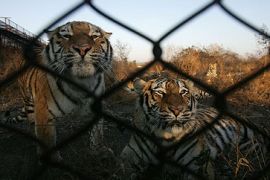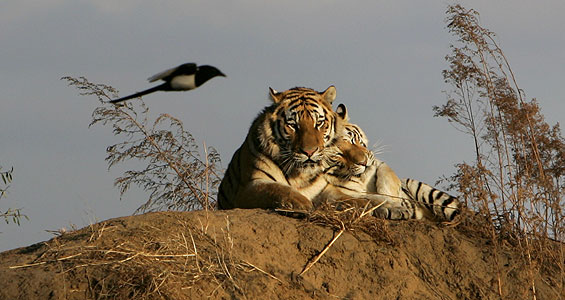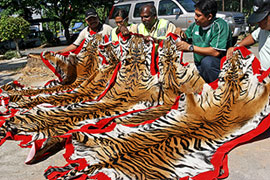Asia urged to ‘save the tigers’
Urgent call to governments for decisive move to save dwindling tiger population.

 |
| Asian countries have been urged to act to halt the decline in tiger numbers [GALLO/GETTY] |
The World Bank has urged China and other Asian countries to close down privately-run tiger farms, saying they are inhumane and fuel demand for body parts of the endangered big cats.
The call came at a multinational meeting in Thailand where representatives from 13 countries with wild tiger population are discussing efforts to pull the world’s remaining tigers back from the brink of extinction.
Keep reading
list of 4 itemsAfter the Hurricane
World’s coral reefs face global bleaching crisis
Why is Germany maintaining economic ties with China?
|
“The tiger may be only one species, but the tigers’ plight highlights the biodiversity crisis in Asia” Robert Zoellick, World Bank president |
The three-day Ministerial Conference on Tiger Conservation in the beach resort of Hua Hin is also expected to agree a target to double the number of tigers in the wild by 2022 by protecting the animals’ natural habitat.
The declaration however excludes new money to finance the conservation programme, The Associated Press reported, citing from a copy of the document.
The 13 nations attending the meeting are Bangladesh, Bhutan, Cambodia, China, India, Indonesia, Laos, Malaysia, Myanmar, Nepal, Russia, Thailand and Vietnam.
The number of wild tigers has plummeted because of human encroachment, the loss of more than nine-tenths of their habitat and poaching.
From an estimated 100,000 wild tigers in the world at the beginning of the 20th century, there are now believed to be less than 3,600 animals today.
‘No room left’
Robert Zoellick, the World Bank president, in a video message to the 180 delegates warned that “there will be no room left for tigers and other wildlife in Asia” if governments continued to neglect conservation efforts.
 |
| Conservationists say tiger farms play a big role in fuelling the illicit trade in tiger parts [EPA] |
“The tiger may be only one species, but the tigers’ plight highlights the biodiversity crisis in Asia,” he said.
The warning comes as conservation groups step up efforts to try to raise awareness of the tigers’ plight ahead, much of it tied to the start of the upcoming Chinese year of the tiger.
Earlier this week the World Wildlife Fund (WWF) said in a report that the Indochinese tiger population, one of the rarest, had hit an all-time low.
“Decisive action must be taken to ensure this iconic sub-species does not reach the point of no return,” said Nick Cox, the co-ordinator of the WWF Greater Mekong tiger programme.
“There is a potential for tiger populations in Vietnam, Laos and Cambodia to become locally extinct by the next [lunar] Year of the Tiger in 2022, if we don’t step up actions to protect them.”
Owners of tiger farms – found mainly in China, Laos, Vietnam and Thailand – say legal products help eliminate illicit trade in tiger parts, long blamed for contributing to the regional threat of extinction of the wild tiger.
But environmentalists claim allowing tiger farms to exist only encourages smuggling.
“Our position is that tiger farms as an animal practice are cruel. They fan the potential use of tiger parts,” said Keshav Varma, the programme director for the Global Tiger Initiative.
“That is extremely dangerous because that would continue to spur demand.”
Corruption
He also blamed rampant and pervasive corruption among officials responsible for conservation and forest management in some countries for the tiger crisis.
| Tigers in crisis |
|
Source: WWF |
“Corruption is gradually and persistently nibbling away at our natural resources,” Varma told The Associated Press from the sidelines of the meeting at the Hua Hin beach resort.
“The politics of money is drowning out the weak voices of the tiger and the poor.”
China, home to most tiger farms, shut down the domestic trade in tiger parts in 1993, imposing stiff sentences on offenders and ordering pharmacies to empty their shelves.
Tiger parts such as skin and bones are mostly used in traditional medicine purportedly to cure ailments from convulsions to skin disease, and increase sexual potency.
Last month China last announced it would take stronger law enforcement action on the trade in tiger parts and products, and promised stricter regulation for captive breeding.
John Siedensticker, the head of conservation at the Smithsonian National Zoological Park and chairman of the Save the Tiger Fund, said he had watched the Javan and Bali subspecies of tiger disappear in the 20th century.
“… Losing a tiger is like losing a very close, dear relative and I’m still saddened by that experience,” he said.
 |
| Tiger skin, bones and flesh are sold as exotic meat and medicine in many countries [EPA] |
Conservation groups like Traffic, the global wildlife trade monitoring network, have praised China’s move to clamp down on the illegal tiger trade but say more still needs to be done, including closing tiger farms.
The group says trading in tiger parts fuels poaching because it is cheaper to kill a wild tiger than a farm-bred animal, and the parts are indistinguishable.
James Compton, a Traffic spokesman, acknowledged that closing down farms was a complex undertaking and that the short-term goal should be on stopping their expansion.
“The process of shutting down the farms is more complex than doing a simple blanket decision to close all the farms,” he said.
“What do you do with all the tigers? What do you do with all the investment from the tiger community?”
 Scientific name: Panthera tigris
Scientific name: Panthera tigris